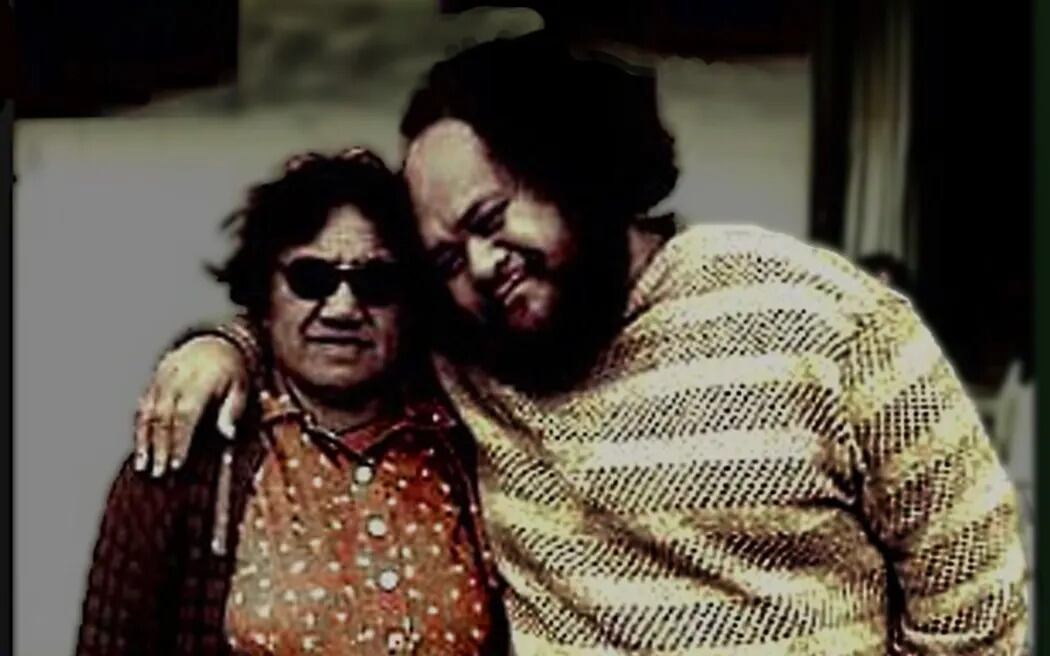When Pātea Māori Club’s Poi E hit number one on the NZ charts in March 1984, a position it would end up holding for a month, producer Dalvanius Prime wept.
They were tears of joy, the club’s chair Laura Maruera remembers. Months of fund raising and studio sessions had gone into landing the top spot on New Zealand’s music charts.
She was 28-years-old during recording, and recalls how the club “slept day and night in the studio” until Prime finally decided the recording was perfect.
He was the driving force behind Poi E, the one who posed the idea of recording the song in a studio and using it to uplift the youth of Pātea, whom Maruera says were discouraged and lost after work opportunities in the town dried up.
He also wrote the waiata, alongside Ngoi Pēwhairangi, in 1982.
What they probably didn’t expect back then is that, four decades later, Poi E would remain one of Aotearoa’s most beloved tunes, a perfectly Kiwiana ditty born from community effort.

“[Prime] wasn’t only our music man - he was our youth guide, he helped our marae, and he was on committees in Pātea and Hāwera, and worked within iwi as well,” Maruera says.
She says Pātea became “a real dead town” after the local freezing works closed down in September 1982.
“Because of the closure of the works, the young ones were just hanging around the streets, there were no jobs left in Pātea,” Maruera said.
“The people of Pātea and Dalvanius came up with the idea of modernising the music for Poi E after we won the competition at Te Matatini in 1983.
“He wanted to modernise and jazz it all up - put it into a bop, get the kids off the street. It was more for the youth, and we were all young and having babies at the time.”
There were daily practice sessions at Pātea High School, while Prime went from shop to shop in the small rural town, asking business for $100 each to help the club record Poi E.
“To get it off the ground, we had the community in Hāwera as well as Pātea fund raise. We did enough performances around the town to make enough to get to the studio in Auckland,” Maruera says.
“We forked out of our own pocket for travel, and we slept, day and night, in the studio until Dalvanius and the guys who were recording were satisfied with our voices.”
Those recording sessions were tough - Prime was a perfectionist, and anyone not performing to their full potential would be rebuked.
“We took it on the chin, because we wanted to see where it would take us, and it was exciting how he encouraged us to continue,” Maruera says.
“He knew what he wanted, and it had to be to a T - if he didn’t like you, it’d be ‘go sweep the floor’, ‘make me a coffee’ or ‘get me a drink’.
“He’d yell at you, and you’d be sorry.”
The female kaea you hear in the beginning of the song, calling “te poi patua, taku poi patua”, belongs to “aunty” Hui Kahu, who died in 2012.
Maruera says Kahu was initially too shy to lead Poi E, but Prime gave her the confidence and practice that would make her voice the most memorable on the track.
Poi E wasn’t the first Māori waiata to reach number one - that honour belongs to Deane Waretini’s The Bridge - but it remains one of NZ’s most well known songs, not just in te reo Māori, but of all time.
It even outsold Michael Jackson’s Thriller, the best-selling record of all time, on NZ’s local charts.
Poi E’s number one achievement opened up a world of opportunities for Pātea Māori Club, who toured nationwide and overseas following the song’s success.
“When we went around the world, we were still trying to grasp that this has happened, and it is still going to happen, and it still lives now,” Maruera said.
“It took us around the world not once, but a few times, and when we went around, everyone knew the waiata. They didn’t know the words, but they knew the tune, and they were dancing.”
About 18 of the original members are still in the club today, with the oldest members being 83-years-old.
The kaumātua may remember a time in Aotearoa, following WWII, when speaking reo Māori was prohibited in schools, and rangatahi could face corporal punishment for speaking their own native tongue.
Their mokopuna, however, may have been educated through Kōhanga Reo - at the very least, they are bearing witness to the revitalisation of te reo Māori.
“Our kids today don’t know any different, they’re so fortunate to have reo Māori artists and songs everywhere. That’s beautiful,” says Pātea Māori Club trustee Janine Mauera.
“To have pioneered that, it’s a huge legacy.”
